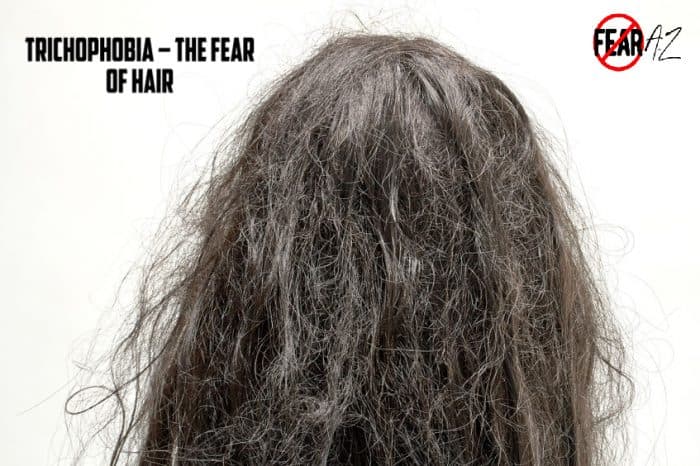Share This Article
Let’s Untangle the Fear of Hair
Phobias denote extreme fears of particular situations or objects. Trichophobia, by definition, means a constant fear of hair, especially the fear of loose hair on the clothing, body, or elsewhere. The fear could result in various symptoms that might affect daily life.
Quick Fact: The fear of hair is also known as chaetophobia.
Do you feel stressed out when you discover loose hair on your chair or shirt? Do you feel anxiety with circumstances involving hair, such as haircuts? If so, you might be experiencing signs of trichophobia, which describes a persistent and excessive fear of hair phobia. For instance, a brush with loose hair might elicit feelings of anxiety and fear.
Although a phobia can initially feel annoying, it might ultimately hinder daily living and your capacity to function in social circumstances or at work. If you’re exhibiting trichophobia symptoms, fear has probably taken over your life. Common symptoms include sweating, dizziness, and rapid breathing. Fear of contamination or disease might contribute to this condition, especially if the fear centers on the sight or sensation of loose hair on your skin. The conviction that hair is a contaminant might cause individuals to fear body hair. People might even adopt obsessive cleaning tendencies to eliminate loose hair on surfaces.
Fortunately, various treatments exist that might help you conquer your fear. Keep in mind that treatment outcomes will differ based on the person, the extent of the phobia, and the approach. Mild fear might respond to lifestyle changes that address anxiety and stress levels, such as deep breathing.
For those with a severe phobia, therapy and, in some instances, the addition of certain medications might be useful. Without treatment, some phobias might lead to substance use disorder, isolation, or serious complications, including self-harm.
Remember, there’s support, and you aren’t alone. Consult your healthcare provider for direction on support groups as well as other resources. For many, the initial step towards addressing this fear is simply to understand the cause.

What Is Trichophobia?
This term denotes the irrational and morbid fear of hair, specifically, hair loss. Individuals with this phobia become very uncomfortable, anxious, and terrified by clumps of hair or loose hair. In most cases, this fear originates from the conviction that the hair is innately dirty or an avenue of contracting diseases or undesirable germs.
This extreme fear causes you to regard hair with disgust. At times, the fear can be so overwhelming that it hinders daily living. In numerous cases, the irrational fear of hair doesn’t take place overnight. The condition takes time for manifestation to take place.
At times, the phobia is simply an unpleasant manifestation of a different facet of the person’s life or wellbeing. For example, someone with a severe fear of hair might also have OCD or obsessive-compulsive disorder, characterized by overzealous organization and cleaning.
People with this phobia frequently recognize the irrationality of their behavior, yet they can’t help themselves. This phobia has intrigued many as people wonder what causes trichophobia or heightens one’s vulnerability to the condition. In some instances, people are generally more vulnerable to phobias if a family member has an irrational fear or if they’ve spent time around those with phobias.
Symptoms of Trichophobia, the Fear of Hair
The symptoms of this phobia are individual in nature. Psychological or physical symptoms that you experience can vary.
Physical Symptoms
- Sweating
- Dizziness
- Rapid breathing
- Difficulty breathing
- Shaking
- Nausea
- Cold or hot flashes
Psychological Symptoms
- A feeling of impending doom
- A feeling of imminent death
- Extreme panic or anxiety
- Feelings of squeamishness or disgust at the sight of hair
- A sense of powerlessness
Avoidance is also a common indication of particular phobias. Individuals with trichophobia might attempt to avoid encountering clumps of hair or loose hair through excessive cleaning. In some cases, people might even exhibit a panic attack when faced with the source of fear. A panic attack manifests as the abrupt onset of intense anxiety. People might feel they can’t breathe, experience the sense that they’re choking, and might even fear that they’re dying or losing their mind.
How to Treat the Fear of Hair
Trichophobia can be a complex and challenging phobia to address. However, appropriate coping techniques and guidance will help you regain control over the phobia so that you can enjoy life.
Self-help
To begin with, you can try your best to accept the fact that there’s hair all around. If you reside with roommates or family, chances are, you’ve seen some strands, particularly in the bathroom.
Remember, loose hair doesn’t comprise nearly sufficient bacteria or germs to cause illness. You don’t have to rush by or avoid exposing yourself to the strands. This isn’t advisable if your objective is to tackle this phobia.
Coping with this phobia is a slow and gradual process that demands a healthy approach. Although it will take some time, you’ll soon discover it was worth it as long as you’re willing to try. Other self-help measures include:
Relaxation Techniques
Explore techniques such as deep breathing, visualization, and progressive muscle relaxation. When you find yourself exhibiting anxiety symptoms in reaction to the sight of hair, adopt the techniques you’ve been practicing to relax your mind and body.
Self-care
Stick to healthy routines such as obtaining sufficient sleep, engaging in physical activity regularly, and eating well. Once you feel well, you’ll be in a better position to manage the anxiety effectively.
Professional Help
If you or a loved one has this phobia, don’t worry. It’s manageable. In most instances, psychotherapy and a combination of particular medications are beneficial. Even talking about your fear is an effective way to deal with this phobia. Professional treatment approaches include:
CBT – Cognitive Behavioral Therapy
This therapy entails exposing someone to the source of their fear and implementing other coping techniques. The focus of this therapy is gaining confidence with your feelings and thoughts. It’s about mastering your feelings instead of your thoughts and feelings overpowering you.
Exposure Therapy
This offers constant exposure to a feared situation or object—in this case, hair. Exposure and the experience of various feelings and thoughts related to fear might help you get to the source of your phobia and discover ways of managing it.
Yoga or Meditation
Yoga or meditation is great for treating this phobia. Both aim to steady and calm the mind. Like any procedure, self-help is gradual. Those with this phobia shouldn’t expect their fear of hair to disappear after a few sessions of yoga or meditation. Taking the initial step is what matters most.
Prescriptions from a Doctor
This option applies only when other techniques prove futile. It’s important to consult a specialist before taking medications to make sure you recognize the possible risks or side effects. The enactment of this mode of treatment should occur conservatively. You’ll find that medications typically cover the physiological effects of different fears rather than treat the phobias themselves.
How to Avoid Trichophobia
By definition, those with this condition can’t prevent it because the phobia exists already. However, they can adopt certain measures to improve quality of life and prevent their future or current offspring from adopting the same phobia. Remember, one becomes more vulnerable to phobias and irrational fears if family members exhibit the same or if they face constant exposure to environments comprised of people with phobias. If you have children, you should seek medical help to decrease the probability of your children developing the fear.
Last Words on the Fear of Hair
A significant step to overcoming this fear is to have a strong network. You’ll discover that dealing with the phobia becomes less overwhelming when you know that there’s support. You should take the time to understand your phobia to gain a feeling of control.




